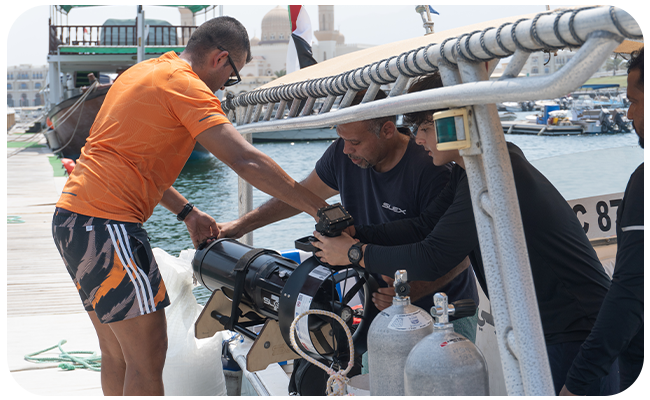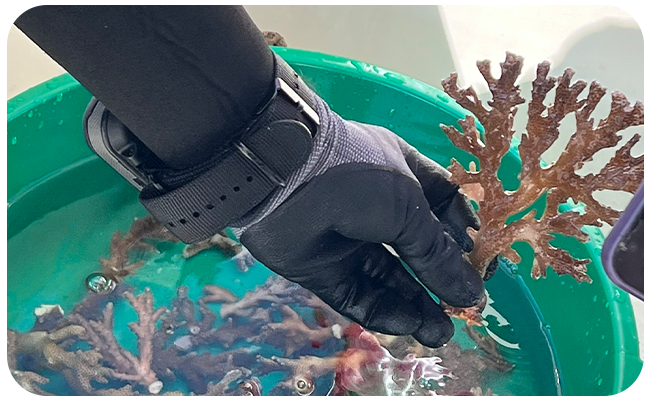In a groundbreaking effort to advance marine conservation, we partnered in an innovative programme that was launched by the Fujairah environment authority and Fujairah Research centre that combines diverse practices with contemporary scientific methods to restore coral reefs and boost marine biodiversity. This pioneering approach exemplifies the spirit of Powering transformative conservation, moving beyond conventional methods to deliver urgent, scalable solutions for nature and people. Initiatives like ours are vital to accelerating the action needed to meet global sustainability goals.
Blending tradition with innovative restoration
Our new method of using the mountains natural stones, palm leaves and oyster shells for coral propagation is inspired by techniques rooted in indigenous cultural practices for centuries. This unique blend of traditional knowledge and contemporary science represents a significant leap forward in efforts to safeguard marine biodiversity. The use of these materials will minimise the cost of waste management and support the efforts towards the circular economy which aims to enhance resource efficiency and reduce waste.
By utilising these abundant natural materials, we effectively reduce reliance on synthetic alternatives, thereby promoting sustainability. The biomaterial structures created from these resources offer crucial habitats for a diverse range of marine species, significantly enhancing ecosystem health. Using 100% locally sourced, renewable materials, our 60,000sqm artificial reef project in the Fiqait area of Fujairah, United Arab Emirates, delivers benefits for both nature and people, demonstrating how conservation can elevate sustainable development and resilience. Our method not only supports natural coral growth and regeneration but also ensures long-term sustainability.


Empowering communities and future marine leaders
Our artificial reef structures are designed for easy deployment from any standard boat in as little as 10 minutes, requiring only a small team of divers. Our deployment process reduces environmental footprints while maximising resource efficiency. By eliminating the need for heavy equipment such as cranes and reducing operational costs and environmental disruption, we are scaling up restoration efforts in a way that is both environmentally and economically sustainable. Deploying the reefs with minimal equipment allows for greater flexibility and faster setup. Additionally, it minimises the risk of damage to both the structures and the marine environment, ensuring the integrity of the reef and promoting sustainable restoration efforts.

One of our main objectives is to bring people together to create a real impact in the ocean: youth, volunteers, academia, government, local community, and restaurants. We’ve developed complete training kits for Early Career Ocean Professionals (ECOPs) and simplified our process to further engage the local community. These training kits have been presented at the American University in Sharjah, the Sharjah English School and many other institutions, fostering environmental action from a young age. Conservation must be inclusive, and our initiative strives to ensure that ocean restoration efforts are grounded in collaboration, local knowledge and shared stewardship.


As an IUCN SSC member expert in the field of coral conservation, I am thrilled to lead the artificial reef and coral restoration projects. The innovative methods we are implementing, such as cutting-edge techniques in reef design and coral transplantation including micro and nano-fragmenting, are truly groundbreaking. These fragments are collected from multiple donor sites and never within the same coral colony. It's exciting to witness the positive impact these efforts are having on reef ecosystems, and I am proud to contribute to such a forward-thinking and collaborative initiative. These projects represent a vital step toward safeguarding marine biodiversity for future generations.

Setting a global standard in reef restoration
One of our goals was to ensure that this model is scalable around the world. To accomplish this goal, we’ve introduced project management tools such as a full risk assessment and mitigation plan, a standardised budget template transferable to any country, a detailed project team structure outlining roles and responsibilities, a Gantt chart with activity breakdowns and a bill of materials. With these tools, our system ensures scientific accuracy, measurable outcomes and easy replication worldwide.
By implementing cutting-edge scientific methods, we are leading the way in coral restoration. With a focus on research, innovation, and data-driven strategies, we are setting new standards in marine conservation. After 8 months of continuous monitoring, assessment, and recording, our site has shown the highest levels of positive bio-indicators. As we look ahead to the IUCN World Conservation Congress 2025, we acknowledge that our efforts are not just about restoring reefs; they are about reshaping the way we approach conservation to meet the urgent global challenges of our time.